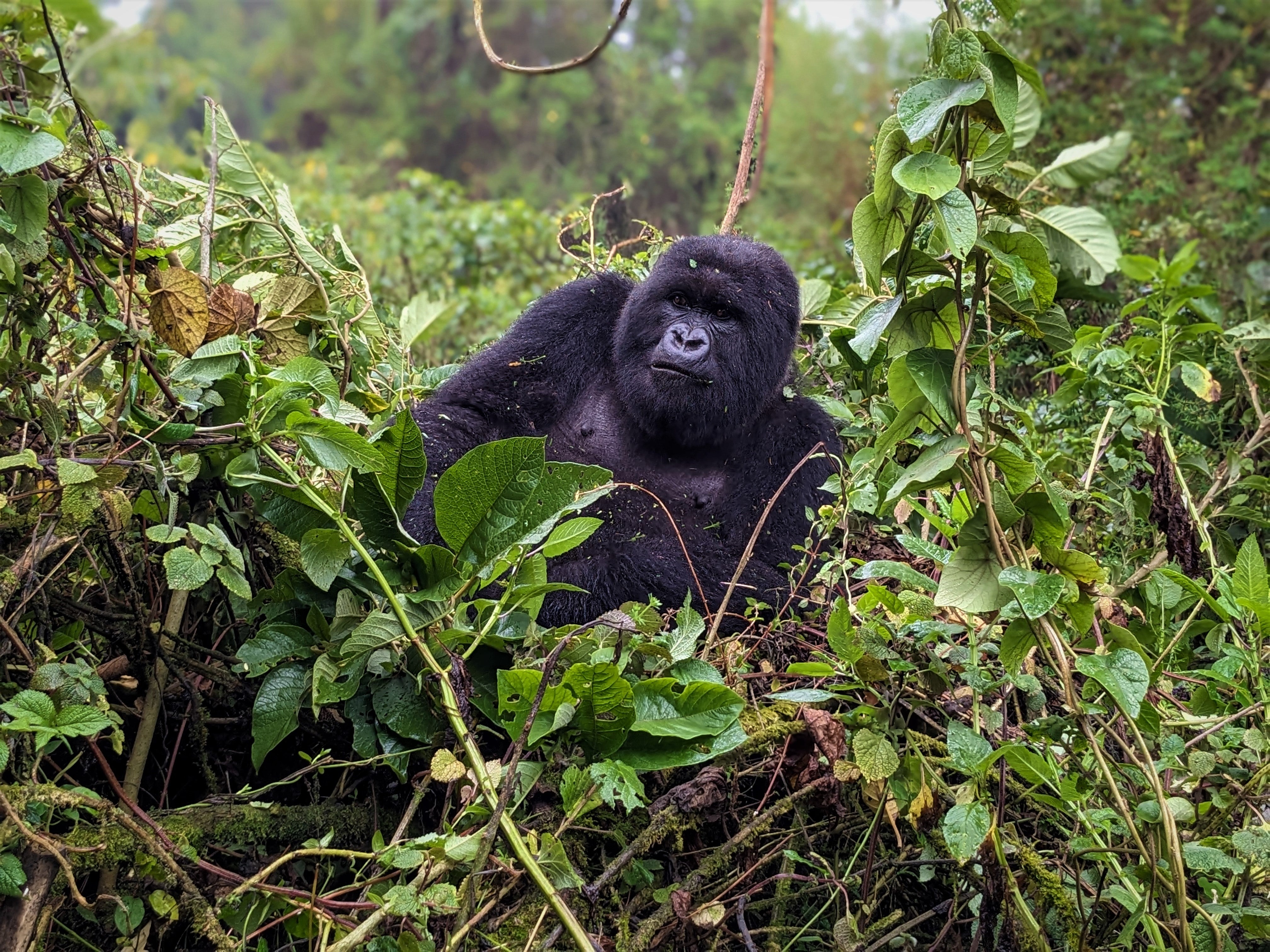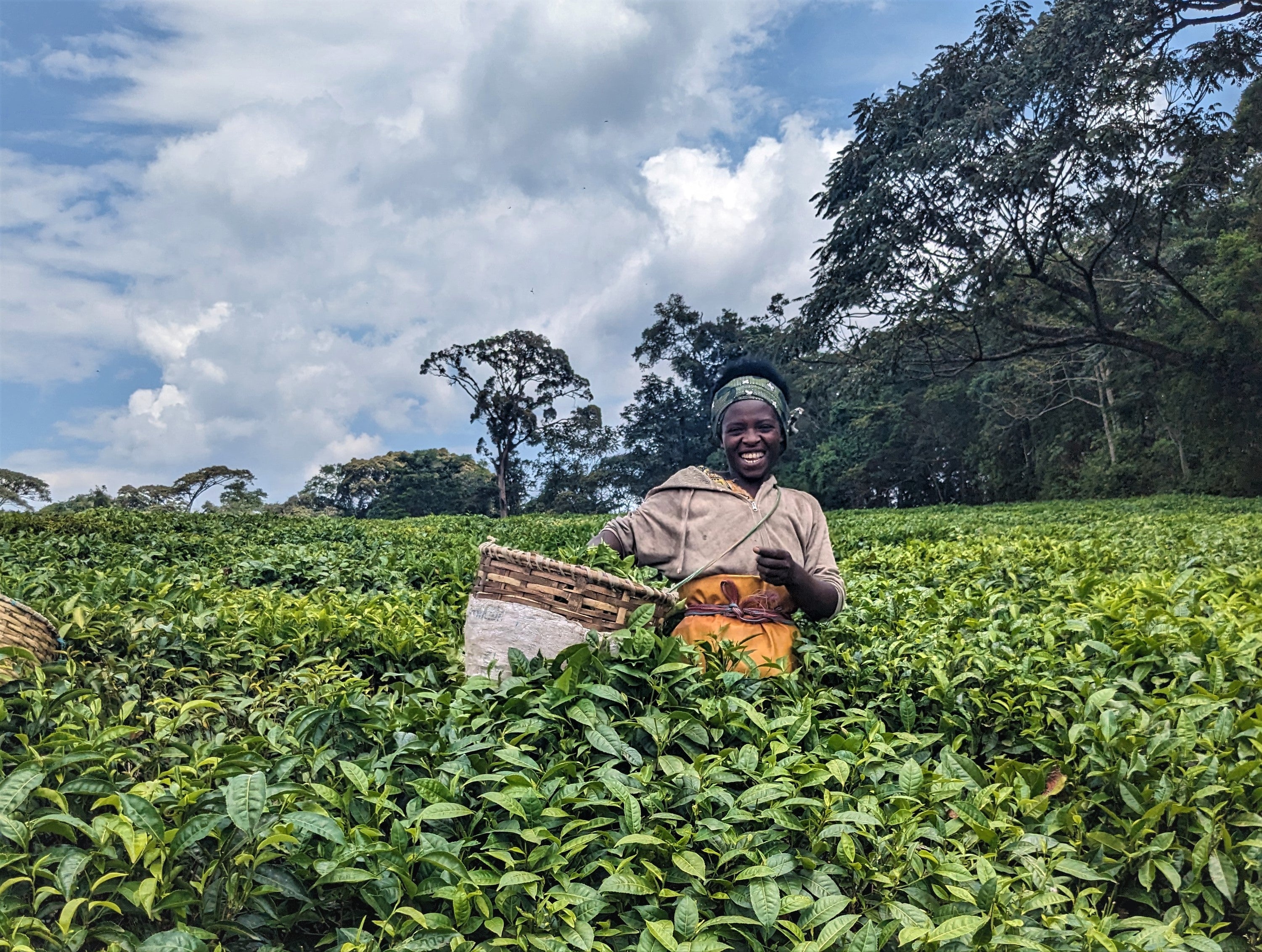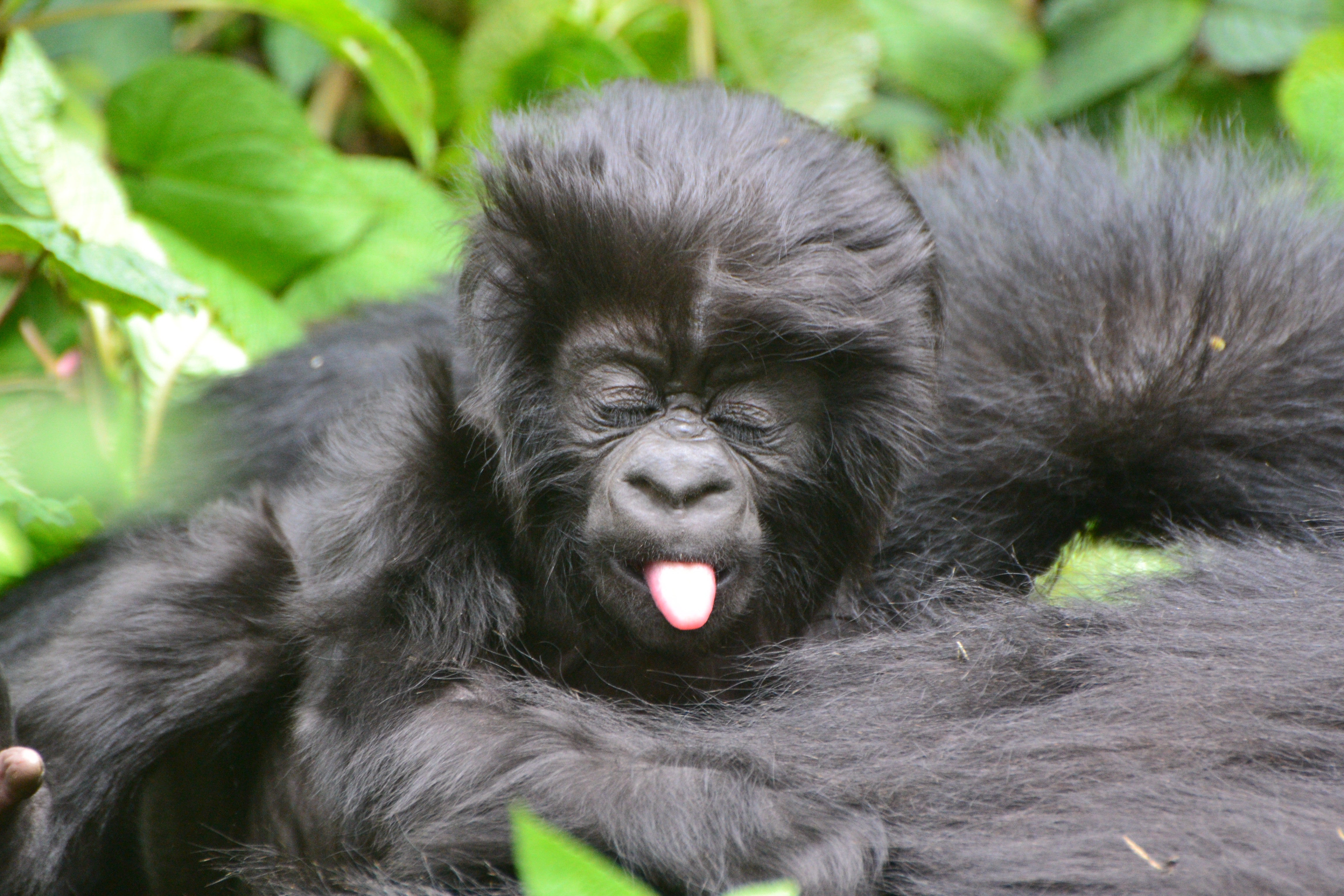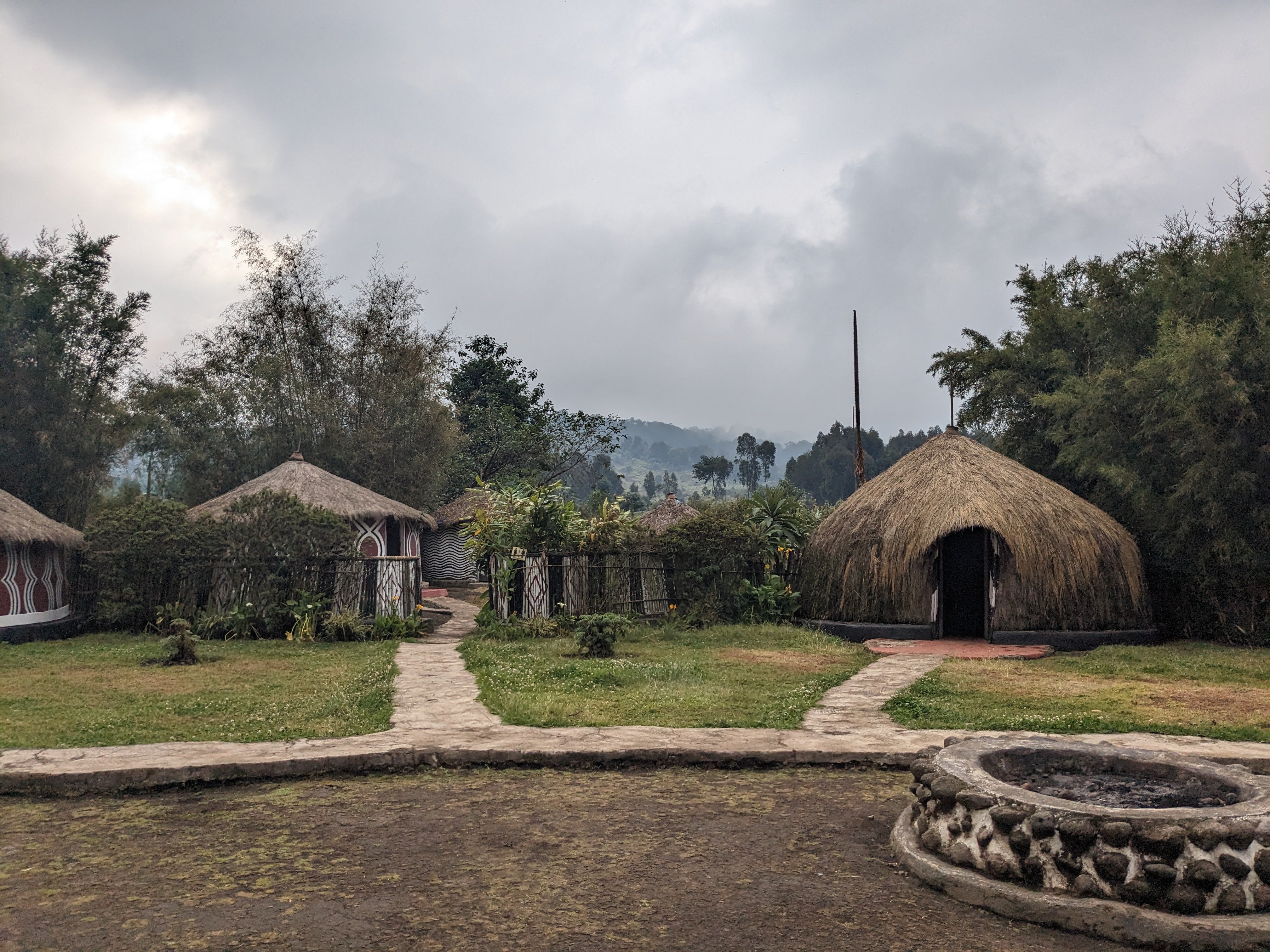Sign up to Simon Calder’s free travel email for expert advice and money-saving discountsGet Simon Calder’s Travel email
Muscling through foliage so thick it feels like I’m discovering a new planet, my foot slips. Tangled roots and rain-slicked nettles feel designed to trip you up – but as quickly as I falter, porter Bernard’s hand is there to haul me up again. Our group of eight has become silent on the hike up Mount Bisoke, not simply to conserve energy and find a firm foothold, but in awe of what comes next: seeing gorillas in the wild.
It feels epic. It is epic. Spending an hour – the maximum contact that’s allowed, per day, with each gorilla family – with these beautiful, gentle creatures is perhaps the most magical wildlife experience to be found on Earth. As we trek up Rwanda’s portion of the Virunga Mountains, we take the privilege seriously. Rwanda’s tourism infrastructure demands that we do.
This east African country is just one of three places where you can see mountain gorillas in their natural habitat. Though other parts of the country enchant with their raw nature and exuberant hospitality, they inevitably feel like a series of support acts leading up to the headliners. The gorillas are Rwanda’s tourism pin-ups, and when you meet them you see why.
 A female gorilla relaxes in the Virunga Mountains (Lucy Thackray)
A female gorilla relaxes in the Virunga Mountains (Lucy Thackray)
I arrive in time for Kwita Izina, a huge September festival which celebrates and promotes awareness of gorilla conservation. International celebrities rock up – Idris Elba and Sol Campbell in 2023 – to christen the baby gorillas born that year, bestowing Kinyarwandan names meaning “long life” or “resilient giant”. Inspired by the Rwandan tradition of naming babies in front of assembled family and friends, it invites some 20,000 residents from communities around the National Park to watch raucous musical performances as well as the ceremony. The enthusiasm is infectious; as photos of 22 baby gorillas are projected several feet high, beady eyes peeking out beneath mohawk tufts of black fuzz, my countdown to seeing them in person begins.
Read more on Africa travel:
With my gorilla trek several days away, I first head southwest to Nyungwe National Park. Rwanda’s compact size means you can easily zip around its nature reserves from the central capital Kigali; Nyungwe is a four-hour drive south. The largest remaining tract of montane rainforest in eastern Africa, it’s a fairyland of towering mahogany trees dripping moss and rope-like vines. You feel like the first person to stumble upon its trails after centuries of undisturbed growth – not far off, since some of Nyungwe’s loveliest hikes were only officially discovered and marked in the last three years.
The largest remaining tract of montane rainforest in eastern Africa, it’s a fairyland of towering mahogany trees dripping moss and rope-like vines
One of these is the 6-mile Ndambarare Waterfall loop. We set off from Gisakura with a guide, which costs $40 per person (£33), through a sun-dappled forest, with only bright, flitting birds and the hoots of colobus monkeys and grey-cheeked mangabeys piercing the silence. Eventually, we hear, then see, the falls, cascading 15 metres down a mossy cliff. “Here, fill up your water bottles,” urges guide David, pointing to a rivulet of glass-clear spring water leaping from the charcoal-black rocks.
You can go chimp trekking here, but I’m more interested in another early morning activity: a cup of tea. At Gisakura’s visitor centre, Ivomo, I’m greeted by the team who show me the modest museum of historic tea farming and drying tools. Next, local women teach me how to gather the very youngest tea leaves rapidly with my fingertips, tossing them elegantly into baskets strapped to our backs. My first sip of Gisakura tea, served black and sweetened with honey, is heaven. I snap up bags of the produce as souvenirs, plus scrunchies and totes made by women’s collectives from bright-kitenge fabric.
En route back to gorilla central, Musanze, I stop at Lake Kivu, a glimmering expanse of water on the border with the Democratic Republic of Congo. It’s a popular getaway for Rwandans, with pretty hotels and kayak hire on its small sandy beaches. After a night at the retreat-like Cleo Kivu, I board a boat trip to Kinunu Coffee Estate for another caffeine fix. Sweet coffee blossoms scent the breeze as guide Fiston takes me through its lakeside washing and drying stations; I’m almost knocked out by the wall of smoky cocoa aroma in the roasting room, and am more than ready to taste a cup or three back on the estate’s comfy terrace.
 A tea field worker in Gisakura, Rwanda (Lucy Thackray)
A tea field worker in Gisakura, Rwanda (Lucy Thackray)
The excitement mounts on the drive to Musanze, the gateway to Volcanoes National Park. Gorilla conservation here is a rare success story. In 1981, the number of mountain gorillas in the Virunga Massif hit an all-time low of 242. A culture of illegal poaching – meeting the demand for gorilla parts as trophies, was rife, compounded by human activity encroaching on the gorillas’ territory. Today, after decades of anti-poaching work and awareness raising, there are more than 600 mountain gorillas here.
In order for the story to continue, Rwanda needs the buy-in of its citizens. One conservation visionary, Edwin Sabuhoro, began working with former poaching communities in the early 2000s, transforming them into farms or tourist heritage centres to generate alternative streams of income. At the Gorilla Guardians cultural village, twentysomething guide Sam is too young to remember the peak of poaching activity here. He takes me to meet a charismatic 85-year-old ex-poacher who now teaches visitors archery; nearby, a younger man teaches tourists about the popular rural brew banana beer, made from banana pulp and sorghum grain for fermentation. We pop open a bottle as I wander and learn.
It’s heartening to see locals of all ages engaged and employed here – as dancers and storytellers, or keeping traditions such as blacksmithing or traditional medicine alive. Meeting the older men and seeing the tough conditions, it’s hard to view poachers as the faceless villains American conservationist Dian Fossey saw them as. Rwanda may have a lucrative wildlife tourism scene, but it must expand to include and benefit the people living nearby.
 Each year there’s a naming ceremony for Rwanda’s baby gorillas (Visit Rwanda)
Each year there’s a naming ceremony for Rwanda’s baby gorillas (Visit Rwanda)
Another cheering stop is the Fossey Fund’s glossy new Ellen DeGeneres Campus, which created 2,350 jobs in Rwanda when the destination was reeling from the pandemic. Here tourists don VR goggles to walk with the silverbacks, watch movies in a 360-degree cinema, and take personality quizzes (put “You are Maggie, the unconventional gorilla” on my tombstone).
But nothing beats the live show. As I squeeze through nettles and brambles, the hiker in front of me suddenly freezes. Our tracker guide makes a low, guttural sound – the “belch” vocalisation that reassures gorillas a trusted friend is present. And there she is: a plump, pregnant female, her jet-black fur framed by a nest of galium vines. She glances at me curiously with amber eyes, chomping all the while. Further up the slopes, a baby swings fearlessly from branch to branch as its 250-pound silverback father keeps a close watch. Our sheer proximity to them feels surreal and awe-inspiring; at one point, a young female gently pushes one of the group aside before crawling past.
 Community projects like Gorilla Guardians help locals earn a piece of the wildlife tourism pie (Lucy Thackray)
Community projects like Gorilla Guardians help locals earn a piece of the wildlife tourism pie (Lucy Thackray)
Rwanda has made the gorilla a symbol of national pride, a mascot the whole country can get behind. And tourists can help – by spreading their spending and visiting more of this adventure-packed country. There’s plenty of culture, and cuppas, to be found beyond this magical mountain home.
Travel essentials
Getting there
Rwandair flies direct from London Heathrow to Kigali from £564 return; or try Brussels Airlines or Kenya Airways for connecting flights.
Staying there
Near Volcanoes National Park, Sambora Kinigi has just four rooms set in rustic cottages and surrounded by unspoiled greenery, with a communal dining room, fabulous local chef and sociable fire pit.
Rooms available from{{#price}}{{price}}per night{{/price}}{{^price}}Check availability for dates and prices{{/price}}
{{#amenities}}Hotel Amenities{{#amenities.foodDrink.length}}
Food & Drink
{{#amenities.foodDrink}}{{.}}{{/amenities.foodDrink}}{{/amenities.foodDrink.length}}{{#amenities.internet.length}}Internet
Please check hotel for more information on amenities
{{#amenities.internet}}{{.}}{{/amenities.internet}}{{/amenities.internet.length}}{{#amenities.services.length}}
Services
{{#amenities.services}}{{.}}{{/amenities.services}}{{/amenities.services.length}}{{#amenities.parking.length}}Parking
Please check hotel for more information on amenities
{{#amenities.parking}}{{.}}{{/amenities.parking}}{{/amenities.parking.length}}{{#amenities.health.length}}
Health & Wellbeing
{{#amenities.health}}{{.}}{{/amenities.health}}{{/amenities.health.length}}{{/amenities}}
Virunga Inn has huge rooms, a spa, sauna, gym and a la carte restaurant.
Rooms available from{{#price}}{{price}}per night{{/price}}{{^price}}Check availability for dates and prices{{/price}}
{{#amenities}}Hotel Amenities{{#amenities.foodDrink.length}}
Food & Drink
{{#amenities.foodDrink}}{{.}}{{/amenities.foodDrink}}{{/amenities.foodDrink.length}}{{#amenities.internet.length}}Internet
Please check hotel for more information on amenities
{{#amenities.internet}}{{.}}{{/amenities.internet}}{{/amenities.internet.length}}{{#amenities.services.length}}
Services
{{#amenities.services}}{{.}}{{/amenities.services}}{{/amenities.services.length}}{{#amenities.parking.length}}Parking
Please check hotel for more information on amenities
{{#amenities.parking}}{{.}}{{/amenities.parking}}{{/amenities.parking.length}}{{#amenities.health.length}}
Health & Wellbeing
{{#amenities.health}}{{.}}{{/amenities.health}}{{/amenities.health.length}}{{/amenities}}
By Lake Kivu and close to tea and coffee farms, Cleo Lake Kivu hotel has huge, modern rooms with freestanding bathtubs and soothing balcony views of the lake; doubles from £370, B&B.
You can also spend a night at the rustic but authentic Kinunu Guest House at Kinunu Coffee Estate; £32, B&B.
Package tours
Original Travel has an 11-day tour of Rwanda, taking in chimpanzee trekking in Nyungwe, a boat trip and coffee farm visit in Lake Kivu, and gorilla trekking in Volcanoes National Park. From £8,295pp based on two sharing, including flights, private transfers and all overland transport, 10 nights’ accommodation, most meals, excursions and entry fees.
More information
Kwita Itzina is held in early September each year; tickets are free to tourists who can organize them through the tourist board, or their tour operator. Gorilla trekking costs £1,245 per person, and can be organised through your hotel or tour operator.
See visitrwanda.com.
Read our reviews of the best Cape Town hotels
Source link : https://www.independent.co.uk/travel/africa/rwanda/rwanda-baby-gorilla-naming-ceremony-b2413599.html
Author :
Publish date : 2023-09-27 07:00:00
Copyright for syndicated content belongs to the linked Source.





